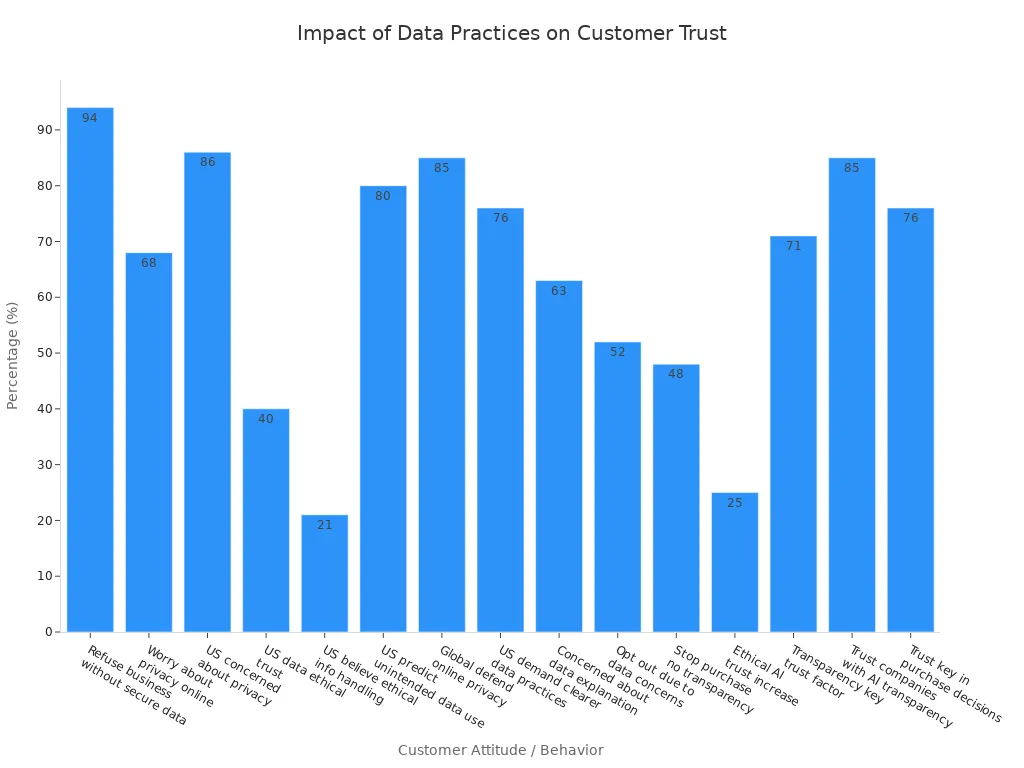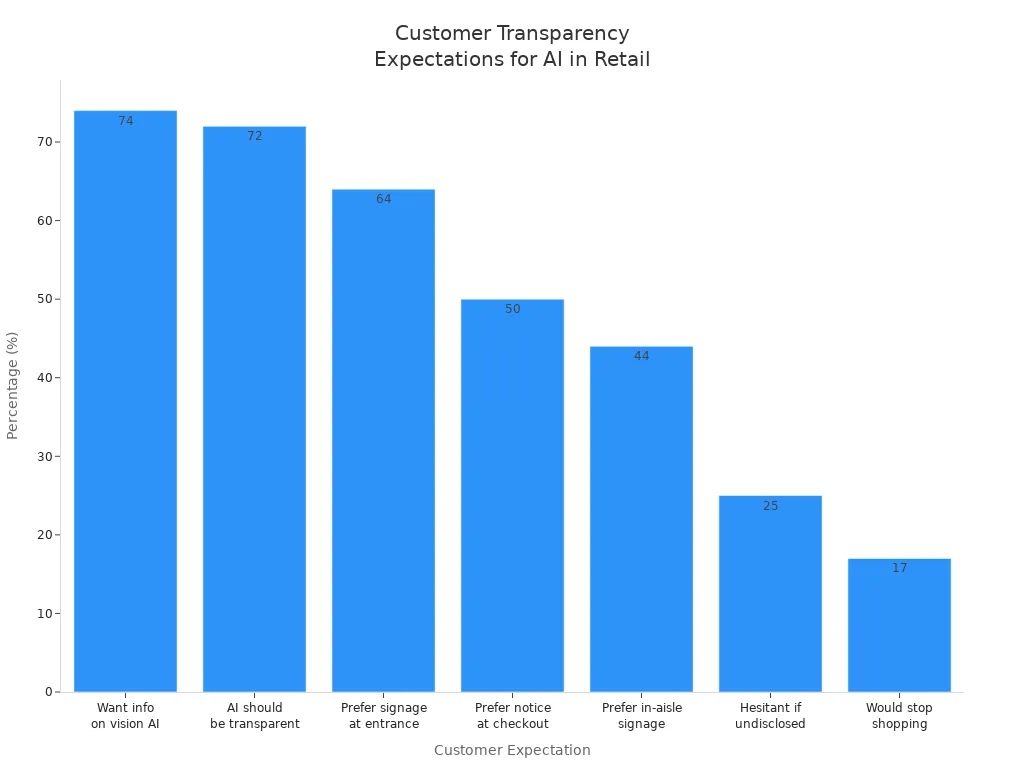AI ethics and data privacy in automated retail systems

Imagine walking into a store where smart cameras track your every move and AI recommends products based on your past purchases. Many people—about 86% in the US—feel concerned about data privacy. You may not realize how much data these systems collect or how companies use it. Some retailers collect more information than needed, while others struggle to explain their data practices. When you see companies prioritize transparency and fairness, you feel safer sharing your information.

To build trust, you need clear communication, strong data protection, and a focus on AI ethics in every step of the retail experience.
Key Takeaways
Understand the personalization-privacy paradox. You can enjoy personalized shopping experiences while being cautious about data privacy. Always ask how your data is used.
Demand transparency from retailers. Look for clear communication about data practices. This builds trust and makes you feel valued as a customer.
Support fairness in AI. Choose retailers that regularly check their AI systems for bias. Fair treatment for all customers enhances your shopping experience.
Take control of your data. Use opt-in options and review privacy settings. Knowing your rights empowers you to make informed decisions.
Stay informed about privacy laws. Familiarize yourself with regulations like GDPR and CCPA. This knowledge helps you protect your personal information.
AI ethics in retail

Personalization and privacy
You see AI-powered retail systems everywhere. These systems use your data to make shopping easier and more personal. When you walk into a store, AI can suggest products you might like or offer special deals just for you. This happens because AI processes your shopping history, location, and even your behavior in real time.
AI improves your experience with:
Real-time data processing
Predictive analytics
Personalized recommendations
You enjoy the convenience, but you may worry about how much data these systems collect. Many people feel cautious about sharing personal information, especially after hearing about data breaches or stories of companies misusing data. You want to know how your information is used and protected.
Customers often feel a tension between wanting personalized service and keeping their privacy. This is called the personalization-privacy paradox.
Evidence Description | Source |
|---|---|
Consumers experience a tension between the desire for personalized recommendations and concerns about privacy, highlighting the personalization-privacy paradox. | Sutanto et al. (2013) |
The context and format of message delivery significantly influence consumer acceptance of personalization in retail AI applications. | Bughin et al. (2017) |
Customers want transparency regarding the recommendations they receive, which is challenging due to the opacity of algorithms. | Burrell (2016) |
You may accept personalized offers in one setting, like online, but feel uncomfortable in another, such as in-store. The way a company explains its data use also matters. When you understand how AI works and how your data is handled, you feel more confident. Businesses that respect your privacy and explain their practices can earn your trust and loyalty.
Bias and fairness
AI ethics in retail also means making sure AI treats everyone fairly. Sometimes, AI systems show bias. This can happen if the data used to train the AI is not diverse or if the algorithms are not checked for fairness. For example, recommendation engines might suggest products mostly for one group and ignore others. Dynamic pricing tools may charge different prices based on where you live or what the system thinks you can pay.
Common problems with bias in retail AI:
AI may favor certain demographic groups, leaving out minorities.
Product suggestions might not reach underrepresented customers.
Historical data can cause AI to miss the needs of new or underserved shoppers.
Pricing algorithms might create unfair price differences.
An MIT study found that the false match rate for people with a lighter skin tone is 0.8%, while for those with a darker skin tone, it is 34.7%. This shows how AI can continue old biases if not carefully managed.
You want to shop in a place where everyone gets fair treatment. Retailers must check their AI systems often to find and fix bias. They should use data from many different groups and test their systems for fairness. You also benefit when companies explain how their AI makes decisions and allow humans to oversee important choices.
Ways to reduce bias in retail AI:
Collect data from many customer groups.
Test and audit AI systems regularly.
Make AI decisions clear and easy to understand.
Use special algorithms to spot and fix bias before using the system.
AI ethics requires companies to take responsibility for their systems. Only 8% of retail executives feel confident in their ability to govern their AI models. This shows the need for better oversight and regular checks. When companies focus on fairness, transparency, and privacy, you get a better and more trustworthy shopping experience.
Transparency and disclosure
Data usage practices
You interact with many AI-powered systems when you shop. These systems collect, store, and use your data in different ways. For example, chatbots help answer your questions and guide you through purchases. They use natural language processing to understand what you need and can even start a return for you. Every time you use these tools, the system collects data to improve future service.
Retailers use several technologies to manage your data:
Technology Type | Function |
|---|---|
Data Management Systems | Centralized repositories for collecting and managing data from various sources. |
Data Integration Tools | Extract, transform, and load data to ensure quality and consistency. |
Cloud Data Platforms | Infrastructure for storing and processing large datasets for scalable AI applications. |
Big Data Tools | Analyze customer behavior and sales forecasting to extract insights. |
Machine Learning | Powers recommendation engines and demand forecasting based on historical data. |
Natural Language Processing (NLP) | Enables chatbots and virtual assistants to engage with customers and analyze sentiment. |
IoT Devices | Generate real-time data for optimizing retail operations and customer experience. |
You may notice that AI-driven retail systems use your data for several reasons:
Sales forecasting to align inventory with demand
Chatbots for customer service automation
Visual search for product discovery
Retailers must tell you how they use your data. Good data usage practices include:
Disclosing when you interact with AI or when AI makes important decisions about your shopping.
Explaining how you can contact a human if you want to challenge an AI decision.
Detailing how your personal data will be used, managed, and protected.
You have the right to know how companies handle your information. When retailers follow these practices, you feel more confident about sharing your data. This approach supports AI ethics and helps build trust between you and the business.
Data Usage Practice | Communication Method |
|---|---|
Personalized recommendations | |
Customer service through chatbots | Instant support |
Inventory and supply chain management | Accurate stock availability |
Dynamic pricing | Tailored offers based on customer behavior |
Retail analytics | Engaging shopping experiences |
Customer expectations
You expect clear and honest communication about how companies use your data. Most shoppers want to know when stores use AI, especially with technologies like vision AI that track movement or behavior. Surveys show that 74% of consumers want to be informed about vision AI usage in-store. About 72% believe AI should be more transparent across all retail sectors.
Many people prefer to see signs at store entrances or get notifications at self-checkout. Some want in-aisle signage to explain how AI works. If companies do not disclose their use of AI, 25% of shoppers may hesitate to return, and 17% might stop shopping there altogether.

Evidence | Percentage |
|---|---|
Consumers wanting to be informed about vision AI usage in-store | 74% |
Consumers believing AI should be more transparent across all retail sectors | 72% |
Consumers preferring signage at store entrances for AI communication | 64% |
Consumers preferring notifications at self-checkout for AI communication | 50% |
Consumers preferring in-aisle signage for AI communication | 44% |
Consumers hesitant to shop again if AI use is undisclosed | 25% |
Consumers who would stop shopping entirely if AI use is undisclosed | 17% |
Transparency in data practices shapes your trust and loyalty. About 86% of consumers believe transparency from businesses is more important than ever. Nearly 90% say they will stop buying from brands that lack transparency. You may wait before sharing personal data with a brand, especially if you do not see clear communication. If a company has a physical location, almost half of shoppers feel more comfortable sharing information.
When you see clear, honest communication about data use, you feel respected and valued. This builds trust and supports strong relationships between you and the retailer.
Retailers who focus on transparency and AI ethics meet your expectations and create a safer, more welcoming shopping experience.
Consent and control
Customer empowerment
You deserve to feel in control of your personal data when you shop with automated retail systems. Many retailers now give you more choices about how your information is collected and used. When you understand what data is being gathered, you can make better decisions about your privacy. Giving you control over your personal information not only builds trust but also aligns with important data protection rules like GDPR and CCPA.
Retailers use several strategies to empower you:
Opt-in options for personalization, so you decide if you want to share your data.
Data minimization, which means collecting only what is necessary.
Strong security measures to keep your information safe from breaches.
You may also see companies use third-party certifications to show they care about your privacy. These certifications help you trust that your data is handled with care. Retailers who use easy-to-understand language instead of legal terms make it easier for you to know your rights.
When you feel informed and in control, you are more likely to trust the retailer and enjoy your shopping experience.
Managing consent
Managing your consent is a key part of AI ethics in retail. You should always know when and how your data is being used. Retailers often use cookie banners or opt-in prompts to let you choose if you want to share your information. They also explain how AI is used in the store or online.
Here are some common ways retailers manage consent:
Clear communication about what data is collected and why.
Consent tools that let you accept or reject data collection.
Regular updates about changes in data policies.
Retailers face challenges when managing consent. Some of these challenges include:
Compliance risk: Not following privacy laws can lead to fines and loss of trust.
Data breach risk: Leaks of sensitive information can harm both you and the company.
Biased decision-making: AI can make unfair choices if trained on biased data.
Lack of transparency: If you cannot see how decisions are made, you may lose trust.
Ethical concerns: Problems with privacy and consent can create a gap between you and the retailer.
You play an important role in protecting your privacy. By understanding your rights and using the tools provided, you help shape a safer and more ethical retail environment.
Compliance and data protection

Privacy laws
You face many privacy laws when you use or manage AI-powered retail systems. These laws protect your personal data and set rules for how companies use AI. Different regions have their own rules. Here is a quick look at some of the most important laws:
Region | Relevant Laws | Description |
|---|---|---|
EU | GDPR, AI Act, DSA | These laws protect your data and control how AI systems work. The AI Act bans high-risk uses like predictive policing. |
US | State laws on facial recognition, algorithmic bias | States have their own rules. Some focus on privacy, others on fairness in AI. |
Asia | PIPL (China) | This law gives you strong rights over your personal data in AI systems. |
Other countries also have strong protections:
GDPR gives you the right to avoid decisions made only by AI.
Brazil’s LGPD requires companies to tell you about automated decisions and explain them.
South Korea lets you reject fully automated decisions that affect your rights.
The Philippines allows you to ask about automated processes that impact you.
If companies break these laws, they can face big fines. You may also get compensation if your data is misused. In the US, you can get between $107 and $799 per incident. Companies must respond to your requests about data access or deletion. They must also keep your data safe and explain how they use it.
Best practices
You can follow best practices to keep your data safe and follow the law. These steps help you build trust and avoid problems:
Ask for permission before using personal information.
Use clear and simple privacy notices.
Protect sensitive data with extra care.
Avoid unchecked surveillance.
Use AI to scan for compliance and spot risks.
Monitor your systems for threats in real time.
Check third-party vendors for compliance.
Update your policies quickly when laws change.
Tip: AI-powered threat detection works up to 30% faster than old methods. AI compliance systems can also update policies 50% faster.
You should also set up a review process for new AI systems. This helps you stay up to date with changing laws. When you follow these steps, you show your commitment to AI ethics and data protection. Most shoppers trust companies that protect their data. In fact, 84% of people say they prefer to buy from brands they trust with their information.
You play a key role in shaping the future of automated retail. When you demand transparency and clear communication, retailers respond by improving their data practices. Regular privacy assessments, honest disclosures, and ongoing oversight help protect your information.
Continuous improvement keeps AI ethics strong and builds trust.
Retailers measure success by tracking customer satisfaction, ethical standards, and compliance. As technology grows, you can expect better security and more personalized experiences.
Action | Benefit |
|---|---|
Ongoing oversight | Stronger data protection |
Clear disclosures | Higher customer trust |
Continuous improvement | Safer AI systems |
FAQ
What personal data do automated retail systems collect?
You may share your name, email, purchase history, and location. Some systems also collect images or video from cameras in stores. Retailers use this data to improve your shopping experience and keep their services running smoothly.
How can you control your data in automated retail stores?
You can review privacy settings, opt out of certain data uses, and ask for your data to be deleted. Look for clear privacy notices and use consent tools. If you have questions, contact customer support for help.
Why do retailers use AI in their stores?
Retailers use AI to help you find products, get faster service, and receive personalized offers. AI also helps stores manage inventory and predict what customers want. This technology makes shopping easier and more efficient for you.
What should you do if you feel your data is not safe?
You should contact the retailer and ask about their data protection policies. You can also request to see or delete your data. If you feel concerned, report the issue to a privacy authority or consumer protection agency.
See Also
Understanding AI-Driven Convenience Stores: Key Insights for Retailers
Navigating Self-Checkout Systems: Benefits and Hurdles for Retail
The Future of Retail: Embracing AI-Enhanced Shopping Experiences
Transforming Retail: The Impact of Smart Electronics Vending Machines
Revolutionizing Online Retail: The Role of AI Management Tools
